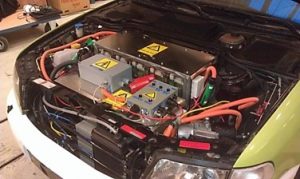The importance of the li-ion batteries is booming and after dominating portable electronics applications, they are entering into sectors like grid support, residential and electro-mobility applications. The penetration of renewables in the power system is considered to significantly increase in near future; thus, batteries can play a crucial role in the reliable and cost-efficient grid integration of intermittent energy sources. Besides, the grid support applications, li-ion batteries have begun to play a major role in the automotive market. The use of batteries in automotive applications is a promising option in order to replace the internal combustion engine cars with ideally, zero-emissions vehicles (full electric vehicles), or with controlled emission vehicles (hybrid electric vehicles and plug-in hybrid electric vehicles). The course is divided into 4 days as follows:
DAY1: (Battery technologies and grid applications)
During that first day, state of the art on the energy storage technologies and power converter solutions will
be provided with a special focus on the Li-ion batteries. Moreover, the services that the energy storage can
provide for grid and residential applications will be discussed. This will be followed by a lecture on operating
principles of li-ion batteries and review of different Li-ion battery technologies. The day will be finished by
Matlab exercise on the sizing of storage in different stationary applications.
DAY2: (Modeling of Li-ion batteries)
The second day focuses on Li-ion battery performance testing and modeling. The day starts with an
introduction to battery testing and characterization methods. Later, details of Li-ion battery electrical and
thermal modeling will be presented. Finally, simulation studies in Matlab will be performed, where course
participants will develop their own performance model of the li-ion battery.
DAY3: (Lifetime of Li-ion batteries)
The third day is dedicated to the aging, performance degradation and lifetime estimation of Li-ion batteries.
Aging phenomena accelerated lifetime testing and lifetime modeling of Li-ion batteries will be covered.
Moreover, methods of online battery state estimation, diagnostics and prognostics will be covered. The day
will be closed by an industrial lecturer presentation.
DAY4: (Automotive applications)
The last day is devoted to automotive applications. Li-ion technologies for automotive applications will
be discussed. Aspects related to li-ion battery management systems for vehicles will be covered. Moreover,
sizing and control of battery-powered vehicles will be addressed. The fourth day will be finished with the
exercise of Li-ion battery powered vehicle.
Flyer
This Industry/PhD course is organized by Aalborg University, Department of Energy Technology. For more information, please check out this flyer: LiIon PhD Course 2018 at AAU.

